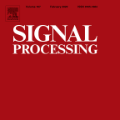Certifying the positivity of trigonometric polynomials is of first importance for design problems in discrete-time signal processing. It is well known from the Riesz-Fej\'ez spectral factorization theorem that any trigonometric univariate polynomial positive on the unit circle can be decomposed as a Hermitian square with complex coefficients. Here we focus on the case of polynomials with Gaussian integer coefficients, i.e., with real and imaginary parts being integers. We design, analyze and compare, theoretically and practically,three hybrid numeric-symbolic algorithms computing weighted sums of Hermitian squares decompositions for trigonometric univariate polynomials positive on the unit circle with Gaussian coefficients. The numerical steps the first and second algorithm rely on are complex root isolation and semidefinite programming, respectively. An exact sum of Hermitian squares decomposition is obtained thanks to compensation techniques. The third algorithm, also based on complex semidefinite programming, is an adaptation of the rounding and projection algorithm by Peyrl and Parrilo. For all three algorithms, we prove bit complexity and output size estimates that are polynomial in the degree of the input and linear in the maximum bitsize of its coefficients. We compare their performance on randomly chosen benchmarks, and further design a certified finite impulse filter.
翻译:暂无翻译




